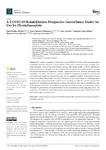Mostrar o rexistro simple do ítem
A COVID-19 rehabilitation prospective surveillance model for use by physiotherapists
| dc.contributor.author | Postigo-Martín, Paula | |
| dc.contributor.author | Cantarero-Villanueva, Irene | |
| dc.contributor.author | Lista-Paz, Ana | |
| dc.contributor.author | Castro-Martín, Eduardo | |
| dc.contributor.author | Arroyo-Morales, Manuel | |
| dc.contributor.author | Seco Calvo, Jesús | |
| dc.date.accessioned | 2021-06-01T08:13:43Z | |
| dc.date.available | 2021-06-01T08:13:43Z | |
| dc.date.issued | 2021-04-14 | |
| dc.identifier.citation | Postigo-Martin P, Cantarero-Villanueva I, Lista-Paz A, Castro-Martín E, Arroyo-Morales M, Seco-Calvo J. A COVID-19 rehabilitation prospective surveillance model for use by physiotherapists. J Clin Med. 2021 Apr 14;10(8):1691. | es_ES |
| dc.identifier.issn | 2077-0383 | |
| dc.identifier.uri | http://hdl.handle.net/2183/28047 | |
| dc.description.abstract | [Abstract] The long-term sequelae of coronavirus disease 2019 (COVID-19) are only now beginning to be defined, but it is already known that the disease can have direct and indirect impacts mainly on the cardiorespiratory and neuromuscular systems and may affect mental health. A role for rehabilitation professionals from all disciplines in addressing COVID-19 sequelae is recognised, but it is essential that patient assessment be systematic if health complications are to be identified and treated and, if possible, prevented. The aim is to present a COVID-19 prospective surveillance model based on sensitive and easily used assessment tools, which is urgently required. Following the Oxford Centre for Evidence-Based Medicine Level of Evidence Tool, an expert team in cardiorespiratory, neuromuscular and mental health worked via telemeetings to establish a model that provides guidelines to rehabilitation professionals working with patients who require rehabilitation after suffering from COVID-19. A COVID-19 prospective surveillance model is proposed for use by rehabilitation professionals and includes both face-to-face and telematic monitoring components. This model should facilitate the early identification and management of long-term COVID-19 sequelae, thus responding to an arising need. | es_ES |
| dc.description.sponsorship | This research was funded by the Spanish Ministry of Education Culture and Sport (FPU17/00939), the University of Granada Excellence Actions (Unit of Excellence in Exercise and Health) | es_ES |
| dc.language.iso | eng | es_ES |
| dc.publisher | MDPI | es_ES |
| dc.relation | info:eu-repo/grantAgreement/MECD/Plan Estatal de Investigación Científica y Técnica y de Innovación 2017-2020/FPU17%2F00939/ES/ | |
| dc.relation.uri | https://doi.org/10.3390/jcm10081691 | es_ES |
| dc.rights | Creative Commons Attribution 4.0 International Licence (CC-BY 4.0) | es_ES |
| dc.rights.uri | http://creativecommons.org/licenses/by/4.0/ | * |
| dc.subject | Cardiorespiratory system | es_ES |
| dc.subject | COVID-19 | es_ES |
| dc.subject | Mental health | es_ES |
| dc.subject | Neuromuscular system | es_ES |
| dc.subject | Prospective surveillance model | es_ES |
| dc.title | A COVID-19 rehabilitation prospective surveillance model for use by physiotherapists | es_ES |
| dc.type | info:eu-repo/semantics/article | es_ES |
| dc.rights.access | info:eu-repo/semantics/openAccess | es_ES |
| UDC.volume | 10 | es_ES |
| UDC.issue | 8 | es_ES |
| UDC.startPage | 1691 | es_ES |
| dc.identifier.doi | 10.3390/jcm10081691 |
Ficheiros no ítem
Este ítem aparece na(s) seguinte(s) colección(s)
-
GI-IPRF - Artigos [152]







